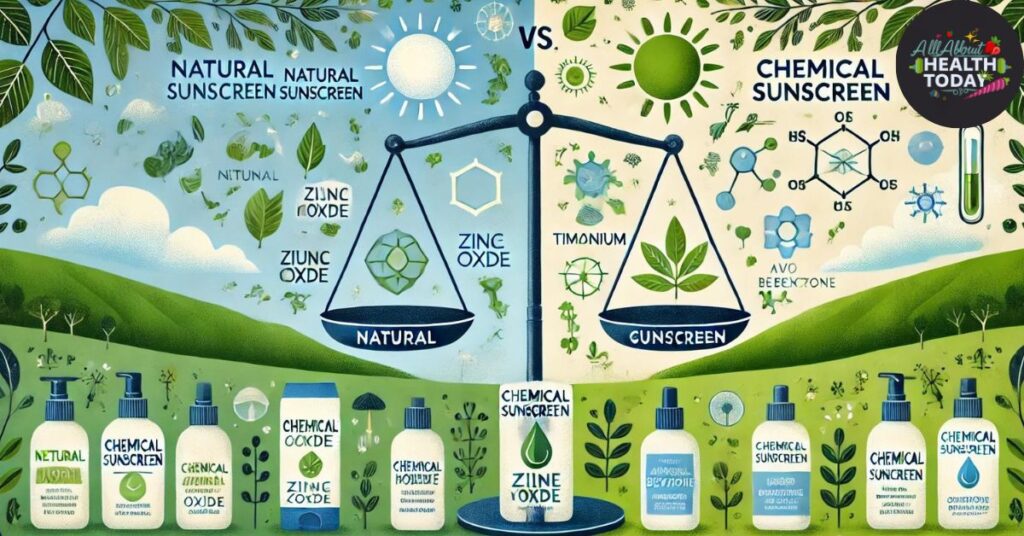Introduction
When spending time outdoors, protecting your skin from the sun’s harmful UV rays and preventing insect bites is crucial for overall health. Prolonged sun exposure can lead to sunburn, premature aging, and an increased risk of skin cancer, while insect bites can cause irritation, allergic reactions, or even transmit diseases.
As consumers become more health-conscious, the debate between natural and chemical products has gained attention. This article explores the differences between natural and chemical sunscreens and insect repellents, helping you make informed choices for your skin’s safety.
Different Sunscreen Types
When it comes to protecting your skin from harmful UV rays, the type of sunscreen you choose plays a critical role. There are two main categories of sunscreens: chemical and natural (also known as mineral or physical sunscreens). Understanding the differences between these types can help you select the right one for your needs.
Chemical Sunscreens: How They Work + Key Ingredients
Chemical sunscreens absorb UV radiation through a combination of active ingredients, such as oxybenzone, avobenzone, and octinoxate. These compounds convert UV rays into heat, which is then released from the skin. Chemical sunscreens tend to be lightweight and are often preferred for their easy application and less visible finish. However, they can sometimes cause irritation, especially for those with sensitive skin, and some ingredients have raised environmental concerns, particularly their impact on coral reefs.
⛑️Consider a broad-spectrum sunscreen that includes safe, dermatologist-recommended ingredients to provide effective protection without irritating sensitive skin. Click Here.
Natural Sunscreens: Benefits & Popular Choices
Natural sunscreens, on the other hand, use physical blockers like zinc oxide and titanium dioxide to reflect UV rays away from the skin. These ingredients sit on the skin’s surface, creating a physical barrier that protects against both UVA and UVB rays. Natural sunscreens are often recommended for sensitive skin types, children, and those looking to avoid potentially harmful chemicals.
Essential oils like lavender and eucalyptus not only offer protection but also provide calming benefits. If you’re interested in how these oils work, check out our detailed guide on the best essential oils.
🌱If you’re looking for a gentle, eco-friendly option, natural sunscreens with zinc oxide offer broad-spectrum protection with minimal irritation. Click Here.

Insect Repellent: Natural vs. Chemical
Just as with sunscreens, choosing the right insect repellent involves understanding the differences between chemical and natural options. Both have their advantages, but it’s important to know which one suits your needs best.
Chemical Repellents: Efficacy & Safety
Chemical insect repellents are typically formulated with active ingredients like DEET, picaridin, or IR3535. These chemicals are highly effective at repelling a wide range of insects, including mosquitoes and ticks, which can carry diseases. However, concerns have been raised about the potential side effects of prolonged exposure to these chemicals, especially on sensitive skin. While generally considered safe when used as directed, some users prefer to avoid them due to possible skin irritation or environmental impact.
Natural Alternatives: Essential Oils and Plant-Based Options
Natural insect repellents often use essential oils such as citronella, eucalyptus, and lavender as active ingredients.
These plant-based options are popular among those seeking a more natural approach to protection. While natural repellents may not last as long as their chemical counterparts, they are generally considered safer for repeated use, especially for children and people with sensitive skin.
Health Considerations
When choosing between natural and chemical sunscreens and insect repellents, it’s important to consider how these products may impact your health. Different skin types and environmental factors play a role in determining which products are best suited for your needs.
Skin Sensitivity and Allergies
Individuals with sensitive skin or a history of allergies need to be particularly cautious when selecting sunscreens and insect repellents. Chemical sunscreens, with their synthetic ingredients, may cause irritation or allergic reactions in some people. Ingredients like oxybenzone and avobenzone are more likely to trigger skin sensitivity. Similarly, chemical insect repellents like DEET can sometimes cause rashes or discomfort, particularly when used frequently or on broken skin.
Natural products, on the other hand, are generally formulated to be gentler on the skin. Natural sunscreens with zinc oxide or titanium dioxide are less likely to cause irritation, making them a better choice for sensitive skin. Likewise, insect repellents made from essential oils tend to be milder, though it’s still important to patch-test any new product to ensure there’s no adverse reaction.
Environmental Impact of Natural vs. Chemical
Beyond personal health, the environmental impact of your sunscreen and insect repellent is also worth considering. Chemical sunscreens have been linked to coral reef damage, leading to bans on certain ingredients like oxybenzone in places like Hawaii. Chemical insect repellents can also pose risks to wildlife and aquatic ecosystems if they wash off into water sources.
Natural sunscreens and repellents are often more eco-friendly, as they avoid these harmful chemicals. Products that use mineral-based sunscreens or plant-derived insect repellents are typically biodegradable and safer for the environment.
How to Choose the Right Products for You
Choosing the best sunscreen and insect repellent involves more than just picking a product off the shelf. To ensure you get the most effective and safe protection, consider your skin type, activity level, and the specific environments you’ll be in.
Matching Products to Skin Type and Activity Level
Your skin type plays a significant role in determining the best sunscreen and insect repellent for you. If you have sensitive or allergy-prone skin, look for hypoallergenic products that are free from fragrances and harsh chemicals. Natural sunscreens with mineral-based ingredients like zinc oxide are typically well-tolerated by sensitive skin. Similarly, insect repellents made with essential oils can provide effective protection without causing irritation.
For those with more resilient skin, or if you’ll be engaging in intense outdoor activities (like hiking or swimming), you might prefer the longer-lasting protection of chemical sunscreens and repellents. Products with water-resistant formulas are particularly beneficial in these situations.
Whether you’re planning a day at the beach or a hike through the woods, it’s essential to choose products that match your skin type and activity level.
Balancing Effectiveness with Safety
When choosing between natural and chemical options, it’s crucial to strike a balance between effectiveness and safety. Chemical products often offer longer-lasting protection and are better suited for high-risk environments, such as areas with a high incidence of insect-borne diseases or intense sun exposure. However, if your primary concern is minimizing exposure to synthetic chemicals, natural products can be an excellent alternative, especially for everyday use in less extreme conditions.
Take Away
It’s clear that each has its own set of advantages and potential drawbacks. Chemical options offer robust, long-lasting protection, making them ideal for extreme environments or intense activities. However, they may not be suitable for everyone, especially those with sensitive skin or environmental concerns. On the other hand, natural alternatives provide a gentler, more eco-friendly approach, which can be particularly beneficial for everyday use and for those with specific sensitivities.
Ultimately, the best choice depends on your individual needs and priorities. Whether you opt for the longer-lasting protection of chemical products or the milder, more natural options, the key is to make informed decisions that balance effectiveness with safety. By understanding the differences and considering your unique circumstances, you can confidently choose the products that are right for you.

